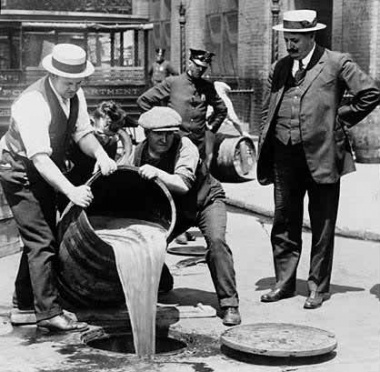Prohibition
 | |
| Date | January 17, 1920 - Dec 5, 1933 |
|---|---|
| Location | USA |
| Interest of | Association Against the Prohibition Amendment |
| Description | The banning of drinkable alcohol (ethanol). This served multiple hypocritical purposes, much like the later "war on drugs". High on the list, as usual, were the private interests of the small clique who arranged it. |
Prohibition refers to the illegalisation of alcohol consumption, ownership and production in USA, which was carried out from 1920-1933. It formented violence,[1] facilitated the develop of clandestine drug trafficking and suppressed the develop of ethanol-powered vehicles, securing the primacy of petroleum as the fuel for vehicular transport.
Contents
Official narrative
| Official narrative on Prohibition - OverSimplified |
Wikipedia remarks that "The Prohibition era was a period in the United States from 1920 to 1933 during which a nationwide constitutional law prohibiting the production, importation, transportation, and sale of alcoholic beverages was enacted. The alcohol industry was curtailed by a succession of state legislatures, and finally ended nationwide under the Eighteenth Amendment to the United States Constitution, ratified on January 16, 1919. Prohibition ended with the ratification of the Twenty-first Amendment, which repealed the Eighteenth Amendment on December 5, 1933. Led by pietistic Protestants, prohibitionists first attempted to end the trade in alcoholic drinks during the 1900s. They aimed to heal what they saw as an ill society beset by alcohol-related problems such as alcoholism, family violence, and saloon-based political corruption."
Many communities introduced alcohol bans in the late 19th and early 20th centuries, and enforcement of these new prohibition laws became a topic of debate. The event the launch of the Eighteenth Amendment passed in 1919 "with a 68 percent supermajority in the US/House of Representatives and 76 percent support in the Senate". The "18th" was ratified by 46 out of 48 states. Enabling legislation, known as the Volstead Act, set down the rules for enforcing the federal ban and defined the types of alcoholic beverages that were prohibited. Not all alcohol was banned; for example, religious use of wine was permitted. Private ownership and consumption of alcohol were not made illegal under federal law, but local laws were stricter in many areas, some states banning possession outright. Soon like the war on drugs nowadays, mafia clans and other crime syndicates soon led opposing parties, even before World War 1 became a pawn in deep lobbying for the aforementioned special interest groups, which the video shown here on the left details.
Ulterior motives
Preventing the establishment of ethanol as a viable alternative fuel - and so ensuring the private monopoly of John D. Rockefeller's Standard oil.[2] Big oil sought by suppressing the more readily producable, cleaner burning ethanol to establish petroleum as the standard fuel for internal combustion engines. John D. Rockefeller donated over $350,000 to the Anti-Saloon League, a lobby group in favour of prohibition.
Background
During the First World War most people considered it to be unpatriotic to use much needed grain to produce alcohol. Also, several of the large brewers and distillers were of German origin. Many business leaders believed their workers would be more productive if alcohol could be withheld with them.
Legislation
Opinion on prohibition began to change and by January, 1919, 75% of the states in America had approved the 18th Amendment which prohibited the "[production], sale or transportation of intoxicating liquors". This became state law when the Volstead Act was passed in 1920.
The Volstead Act was passed shortly after as an “enforcement” act to ensure Congress could actually implement the amendment. The bill included provisions to poison alcohol so as to discourage people from drinking. The Anti-Saloon League (ASL) lobbied against any mandatory ‘poison’ labels on denatured alcohol.[3]
Mass poisoning
The Volstead Act encouraged producers to 'denature' (i.e. poison) alcohol in the 1920s. As Deborah Blum, professor of science journalism at the University of Wisconsin noted, by mid-1927 “[t]he Treasury Department also demanded more methyl alcohol be added — up to 10% of total product. It was the last that proved most deadly.” A 1927 study of confiscated liquor in New York City found that 98% contained some sort of poison, so the government was aware that these measures were poisoning people, but in its enthusiasm to punish those who were illegally drinking alcohol, it continued to mandate increased poison levels.[3]
New York City Chief Medical Examiner Charles Norris said, “The government knows it is not stopping drinking by putting poison in alcohol… Yet it continues its poisoning processes, heedless of the fact that people determined to drink are daily absorbing that poison. Knowing this to be true, the United States government must be charged with the moral responsibility for the deaths that poisoned liquor causes, although it cannot be held legally responsible.”[3]
This is estimated to have killed perhaps 10,000 people.[4]
Denial
Wayne Wheeler, head of the ASL, initially claimed only one person had died because of denatured alcohol since 1920 and was widely ridiculed. Hastily, he modified his argument, stating that "... the government is under no obligation to furnish people with alcohol that is drinkable when the Constitution prohibits it. The person who drinks this industrial alcohol is a deliberate suicide.”
Repeal
It was repealed on Dec 5, 1933 after a meeting of US business leaders.
Consequences
Organised bootlegging was a boon to organised crime in general and the mafia in particular. The consequent fatalities have been estimated to lie somewhere from from 10,000 to 50,000 people.[3] The point was proved that laws against consumption of intoxicating substances do not necessarily reduce consumption rates, but can be relied upon to increase prices, profits and trade related violence and corruption. This lesson was not lost on those who started the "War on Drugs" under Richard Nixon.
References
- ↑ http://thefreethoughtproject.com/paradigm-shift-history-channel-air-documentary-exposing-cia-drug-trafficking/
- ↑ https://www.youtube.com/watch?v=6q0qcDn5ePI
- ↑ Jump up to: a b c d http://theantimedia.org/that-time-the-us-government-purposely-poisoned-thousands-of-americans/
- ↑ https://wearechange.org/werent-taught-u-s-governments-national-experiment-extermination/